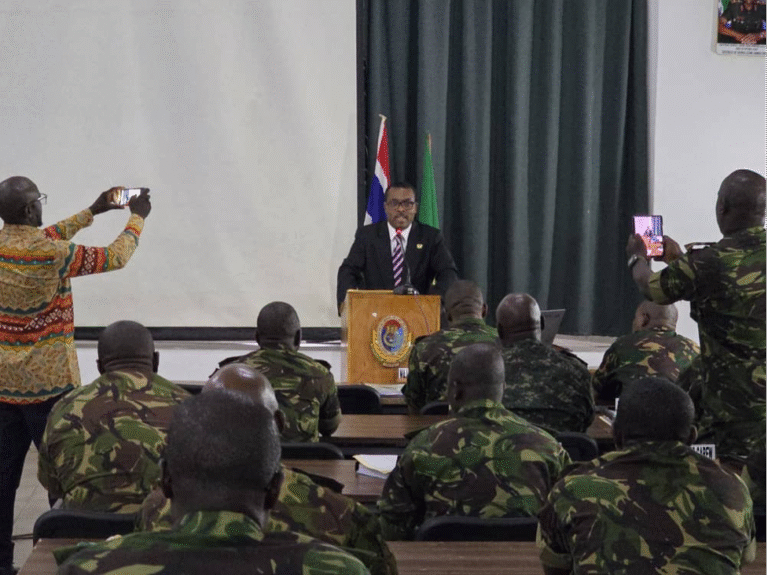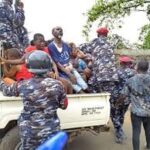𝐍𝐞𝐰 𝐁𝐫𝐨𝐨𝐤𝐟𝐢𝐞𝐥𝐝𝐬 𝐇𝐨𝐭𝐞𝐥, 𝐉𝐨𝐦𝐨 𝐊𝐞𝐧𝐲𝐚𝐭𝐭𝐚 𝐑𝐨𝐚𝐝, 𝐅𝐫𝐞𝐞𝐭𝐨𝐰𝐧 24𝐭𝐡 – 25𝐭𝐡 𝐉𝐮𝐥𝐲, 2025
In a concerted effort to produce reliable and relevant statistics that meet the needs of key stakeholders, Statistics Sierra Leone (Stats SL), in collaboration with the United Nations Population Fund (UNFPA) and the Government of Sierra Leone (GoSL), successfully hosted a two-day Data Users and Producers Workshop for the upcoming 2026 Sierra Leone Population and Housing Census (SLPHC’26).
The workshop aimed to assess the data needs of diverse stakeholders and gather critical feedback on proposed changes and topics for inclusion in the 2026 census questionnaire.

Participants included representatives from government Ministries, Departments, and Agencies (MDAs), the private sector, international development partners, research and academic institutions, media organizations, religious groups, civil society organizations (CSOs), women’s and youth groups, vulnerable populations, and members of the Census Advisory and Technical Committees, among others.

In his welcome address, Mr. Sam Palmer, Quality Assurance Specialist and Head of Population and Development at UNFPA Sierra Leone, described the workshop as a vital platform for sharing insights, identifying data gaps, improving data literacy, and promoting constructive dialogue between data producers and users. He reiterated UNFPA’s commitment to partnering with the Government of Sierra Leone and Stats SL to strengthen national statistical systems, emphasizing that reliable data is the cornerstone of sound development planning, evidence-based policymaking, and tracking progress toward national goals and global commitments such as the Sustainable Development Goals (SDGs).

Mr. Moses Williams, Chairman of the Stats SL Council and Chair of the Census Advisory Committee, expressed his appreciation for the participants’ commitment to the consultative process. He emphasized inclusivity as a fundamental principle for a successful 2026 census and encouraged active participation, stronger partnerships, and a shared commitment to national development.

Officially opening the workshop, Rev. Dr. Jonathan Titus-Williams, Deputy Minister of Planning and Economic Development (MoPED), stressed the importance of inclusive and participatory engagement in the census process.

“To maximize the value of the census, the entire process must be inclusive, participatory, and responsive to the needs of both data users and producers. This is the very purpose of this workshop. The collective experiences, insights, and recommendations gathered here will be key in shaping a census that truly reflects Sierra Leone’s realities and informs the policies that will shape our future.”

He underscored the census as more than a statistical exercise—highlighting its role as a foundation for equitable development, good governance, and evidence-based decision-making. He reaffirmed the government’s unwavering commitment to delivering a reliable, inclusive, and high-quality 2026 Population and Housing Census.

Following the keynote addresses, Mr. Andrew Bob Johnny, Statistician-General and Chief Census Officer, presented a detailed update on the implementation status of SLPHC’26. This was followed by a presentation from Mr. Abdulai Salia Brima, Director of Censuses and Geographic Information Systems (GIS) and National Census Coordinator, who outlined the proposed topics, tabulations, and dissemination strategy for the 2026 census.

Participants were then given the opportunity to ask questions, raise concerns, and provide feedback on the process, ensuring their voices contribute meaningfully to shaping the final census design.

The workshop concluded with renewed hope and a collective commitment to producing credible and high-quality data—essential for planning inclusive development, designing effective policies, and addressing the needs of all segments of Sierra Leone’s population.
©️ 𝐒𝐭𝐚𝐭𝐬 𝐒𝐋 𝐂𝐨𝐦𝐦𝐬 & 𝐏𝐑 𝐔𝐧𝐢𝐭








